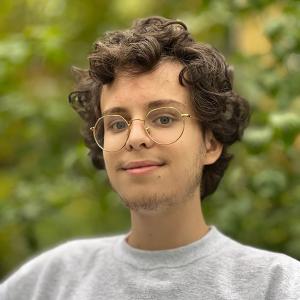One of the strengths of Oberlin's jazz program is the relative freedom students are allowed in forming small ensembles. At other Conservatories, jazz ensembles are assigned based on an audition and on seniority, rather than based on student background or interest; you may, as a freshman, find yourself playing in an all-Charlie Parker ensemble, or in a band devoted to the works of Charles Mingus, even if these two composers are familiar territory for you. All groups at Oberlin are student-formed, and the repertoire is student-selected, and I think this is critical for a number of reasons. First of all, it prevents the grade levels from being stratified: freshmen get to play with seniors, and the resultant open exchange of information is beneficial for everyone. Second, it creates a fertile environment for student composers to hone their style. I would say that every jazz major at some point in their time at Oberlin brings in at least one original composition to an ensemble. Some of us (and I proudly include myself in this category) inflict many original compositions on our ensembles.
I am of the opinion that part of the reason why jazz is dwindling as a popular art form is that the number of inventive composers writing for jazz instrumentation has decreased over the years. Much of the responsibility for this rests on Wynton Marsalis' shoulders (the Tory of the jazz political realm), but I also think that so much pedagogical emphasis has been placed on performing jazz at a high technical level that the composition process has fallen by the wayside. Pop tunes from the 20's and 30's, which make up most of the "standard" jazz repertoire, can only be reimagined so many ways--no matter how fast you can play, or how many harmonically advanced melodic lines you can impose on chord changes, "Here's That Rainy Day" is still going to be "Here's That Rainy Day." By allowing students to mix original compositions with more traditional repertoire, Oberlin is not only cultivating the next generation of skilled jazz performers, but of composers too.
[photo no longer available]
Mid-performance at the Cat in the Cream
Lastly, the relatively small size of the program means that everyone gets to know each other quickly. My first semester at Oberlin was the first time that I'd ever played acoustic jazz at a high level, and the transition from my high school jazz band to the ensembles here was jarring. I made a lot of very embarrassing mistakes, and felt--correctly--that I knew almost nothing about the music I was trying to make. Some of my peers came from New York City and were used to seeing the most cutting-edge names in jazz perform live on a weekly basis; I was lucky to see one decent jazz concert a year make its way to Maine. Suffering through this steep learning curve was alleviated by playing in groups with friends and familiar faces, who were willing to be patient with me (and who were probably struggling a bit themselves).
This semester I'm playing in a piano trio, a group dedicated to playing the music of Ornette Coleman, and a jazz/metal group (so-called) performing originals and, er, abrasive takes on some old favorites. This last group is going to record in the TIMARA studio on December 2nd, so expect to hear more about that later on. All three groups have been great fun, and while I've continued to struggle with playing my instrument at a level I deem satisfactory, I'm finding that I'm cringing less and less often when I listen to recordings of my performances. Ah...Progress.


